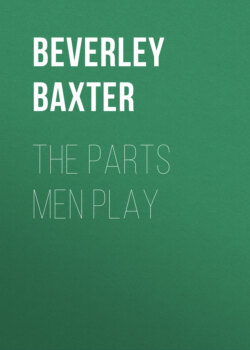Читать книгу The Parts Men Play - Beverley Baxter - Страница 40
На сайте Литреса книга снята с продажи.
THE CAFÉ ROUGE. I.
ОглавлениеMonsieur Anton Beauchamp was the proprietor of the Café Rouge in London. Monsieur Anton Beauchamp was once proprietor of the Café Bleu in Paris.
For many years he had cast envious eyes on London. Did not always his guests, those strange blonde people with the clothes like blankets, pay his prices without question? Did they not drink bad wine and never add the bill? Pardi! if he could have only English as patrons, madame and himself could purchase that wine-shop in the Bou' Mich', and never worry again.
For years the thought of London haunted Anton; and then one day, in a superb moment of decision, he announced his intention of journeying thither. A large entourage followed him to the Gare du Nord, and, with much the same feelings as those of an explorer leaving for the North Pole, he bade a dramatic farewell, and almost missed his train by running back to give a final embrace to Madame Beauchamp.
With no undue mishap he reached London the same night, and next day he lunched at a famous London restaurant. At night he dined at a fashionable establishment in Shaftesbury Avenue. In both places he received ordinary food served without distinction, reckoned up the bill, and found that in each case l'addition was correct—and rushed madly back to Paris, where he sold the Café Bleu, packed up his belongings, and explained matters to his wife, doing all three things simultaneously.
'The dinner,' he exclaimed in a fever of excitement, 'is served—so! As a funeral. I order what I like, and the waiter he stands there comme un gendarme, as if it is my name I give. "Any vegetables?" demands he. Mon Dieu! As if vegetables they are no more to him than so much—so much umbrellas. I say, "Garçon, la carte des vins!" and, quite correct, he hands it me with so many wines he has not got, just as in Paris, but—que penses tu?—he permits me to order what wine I choose, so—by myself. C'est terrible! I give him three pennies and say, "Garçon, for such stupidity you should pay the whole bill."'
Monsieur Beauchamp was a man of shrewdness. He knew he could not compete with the established solidity of the Trocadero, the Ritz, the Piccadilly, or the garishness of Frascati's, so he purchased and remodelled an unobtrusive building in an unobtrusive street between Shaftesbury Avenue and Oxford Street, but clear of Soho and its adherents. He decorated the place in a rich red, and arranged some cabinets particuliers upstairs, where, by the screening of a curtain, Madame the Wife and Monsieur the Lover could dine without molestation of vulgar eyes.
Monsieur Beauchamp felt himself a benefactor, a missionary. He argued that the only reason Londoners were not so flirtatious as Parisians was lack of opportunity. He, the proprietor of the Café Rouge, would bring light to the inhabitants of the foggy city. To assist in this philanthropic work he brought with him an excellent cook, who had killed a dyspeptic Cabinet Minister by tempting him with dishes intended only for robust digestions, and three young and ambitious waiters; while madame engaged what unskilled labour was required.
Unobtrusively they opened for business, for he knew that publicity would spoil his chance of success. (Once convince a Londoner that he is one of a select few who know a restaurant, and he will stand an hour waiting for a table.) The first customer to enter received such attention that he brought his family the next night. Monsieur Beauchamp issued orders that he should be snubbed. Parbleu! was the Café Rouge for families?
Gradually the justification of Monsieur Beauchamp's policy became evident. Ladies of the Chorus brought their admirers there, and to the former Monsieur Beauchamp paid particular courtesy. Long study of feminine psychology had taught him that, whereas a woman may change her lover, she will not change her favourite café. Therefore, though the man may pay the bill, the woman is the one to please. Artists from Chelsea would come as well to the Café Rouge, celebrating the sale of a picture, and drinking plentifully to the confounding of all art critics. Also, the cabinets particuliers were the scene of some exceedingly expensive and recherché dinners—and almost no one added the bill. When any one did, Monsieur Beauchamp was mortified, and invariably dismissed the same waiter on the spot—thereby gaining for himself and France a reputation for sterling integrity.
'Ma foi! London may be gray,' thought Monsieur Beauchamp, 'but she pays well.'
